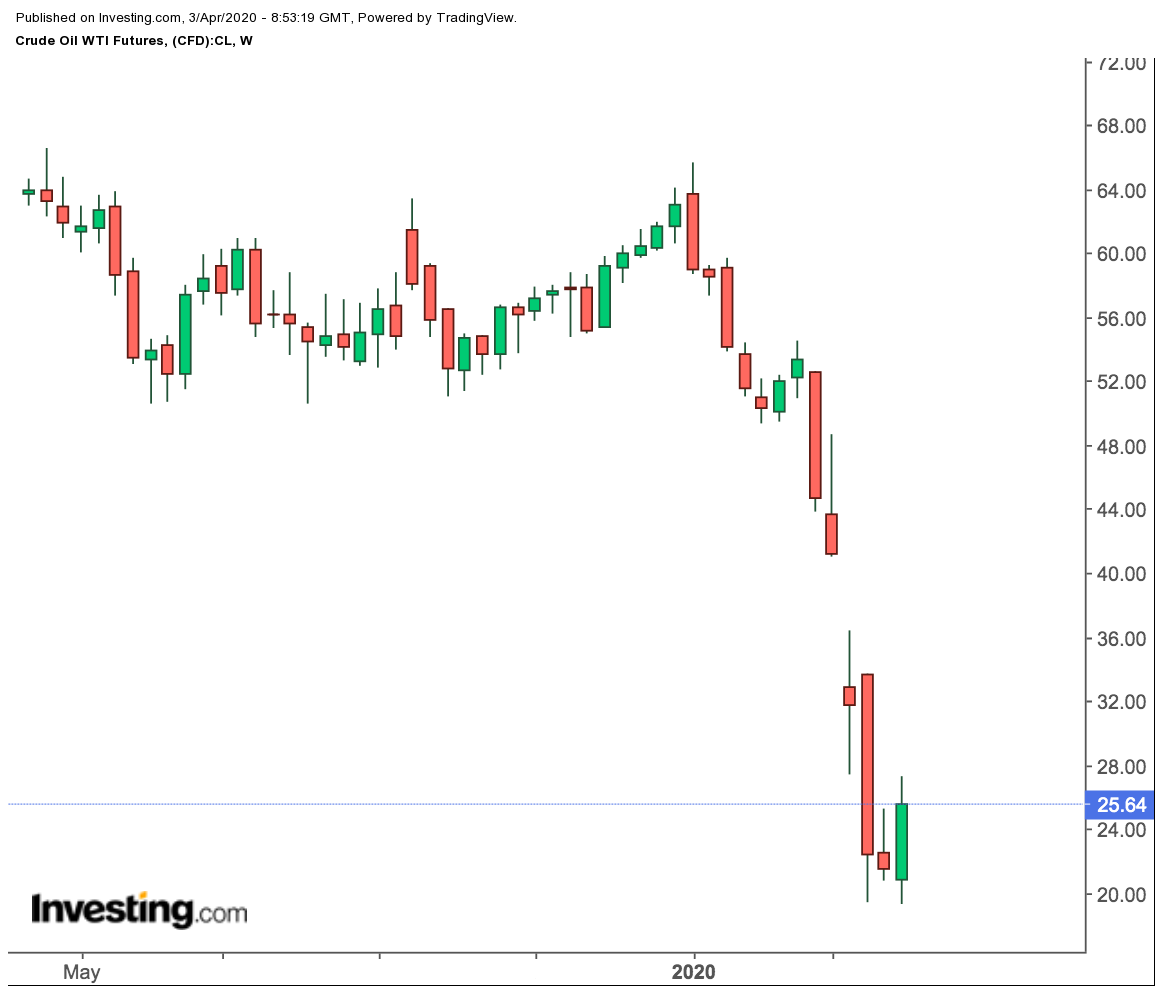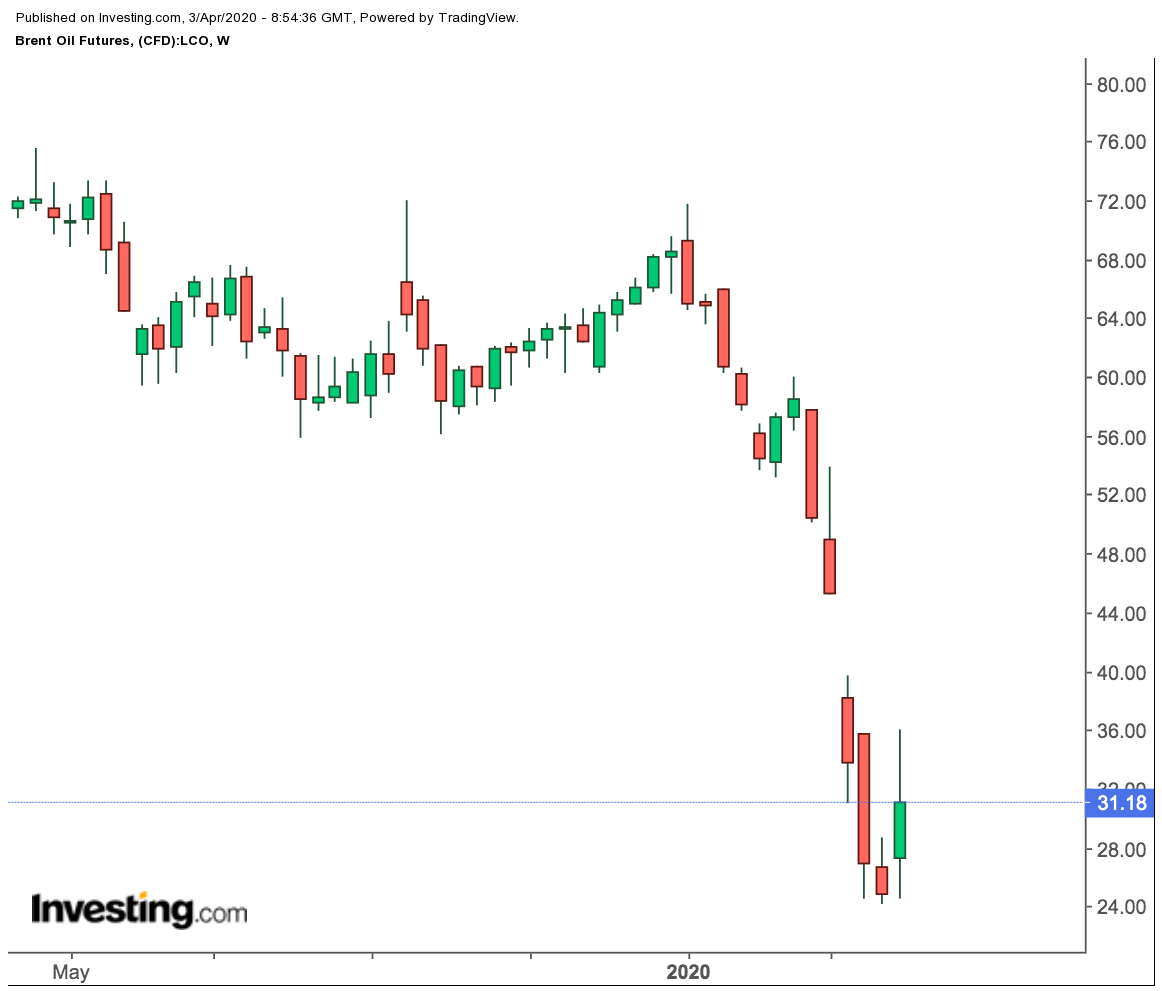To me, the most believable thing about the Saudis, Russians and the rest of OPEC meeting again is that they’ll be meeting again.
Everything else is a big “if,” including production cuts that might follow. Especially production cuts to the size of 15 million barrels (per day, if that’s what they’re supposed to be.)
As traders in the U.S. braced for the possibility of U.S. crude prices revisiting the teens yesterday, President Donald Trump decided to give bulls in the market some cheer. 
Shortly after Wall Street sank on reports that 6.6 million Americans filed for jobless claims last week — double the previous week’s record — as the debilitating effects of coronavirus widened, Trump fired off a couple tweets that lifted not only stocks but also sent crude prices flying.
The first tweet read: “Just spoke to my friend MBS (Crown Prince) of Saudi Arabia, who spoke with President Putin of Russia, & I expect & hope that they will be cutting back approximately 10 Million Barrels, and maybe substantially more which, if it happens, will be GREAT for the oil & gas industry!”
The tweet second continued where the first left off: “.....Could be as high as 15 Million Barrels. Good (GREAT) news for everyone!”
Trump Finally Wants Higher Oil Prices
I’m sure U.S. crude producers find it great to have the president finally on their side for higher prices, instead of tweeting gleefully on how cheap gasoline was at the pump each time the market crashed on oversupply or from disunity within OPEC.
But while navigating seamlessly from his role as the nation’s chief pandemic fighter to OPEC peacemaker, Trump seems to have overlooked the math of global oil output.
According to what most in the market know, Saudi production currently stands at between 12 million and 12.3 million barrels per day. That would be a safe bet, if the kingdom had indeed raised by 30% its output from last month, as targeted. Russia, meanwhile, is known to pump about 10.8 million barrels daily.
A cut of 15 million barrels per day would account for 65% of combined Saudi-Russian production. It would be even higher than all of U.S. production, which as of last week, was estimated to be around 13 million barrels per day.
The Saudis have typically been generous in cutting more than they should under their previous OPEC+ pacts with the Russians. Moscow, in contrast, often played hooky during the three-year-plus alliance, before pulling out altogether in March.
An angered Riyadh has since maxed its production and offered its crude at rock-bottom prices, to grab as much market share as possible from the competition. Combined with the oil glut from the demand destruction caused by the COVID-19, the Saudi strategy had led to a perfect storm for oil prices.
Trump should be given credit for trying to broker peace between the two sides now, although the near chock-full situation of crude storage facilities worldwide meant that some sort of a deal — or at least self-imposed cuts — was imminent among producers.
Yet, no one should expect the Saudis or Russians to contribute in a significant way to a 10-million, let alone 15-million, -barrel cut.
Asked at a White House briefing later in the day where he got those numbers from, Trump replied: “That’s what they told me.”
He added:
“I was actually told it may be 10...and it could be as high as 15. Hopefully they’ll announce something soon.”
Pressed further, the president said it was his “guess” that the deal he brokered “can be broken”, although he believed “both want to make a deal”.
The Saudi Press Agency, in a series of tweets, confirmed the talks between Trump and Saudi Crown Prince Mohammad bin Salman. It also said MBS’ father, King Salman, had requested the enlarged OPEC+ group, that includes ally Russia, to gather for a new discussion on how to support the market amid the demand destruction caused by the coronavirus pandemic.
“The Kingdom calls for an urgent meeting for OPEC+ states and another group of countries, with aim of reaching a fair solution to restore a desire balance of the oil markets,” the press agency tweeted. “This invitation comes within (the) framework of the Kingdom's constant efforts to support the global economy in this exceptional circumstance, and in appreciation of the US President's request and the US friends' request.”
Yet, the impression given by Trump that a consensus has been reached between the House of Saud and the Kremlin was dubious at best. The Kremlin’s spokesman, Dmitry Peskov Russia, told Reuters that President Vladimir Putin had not spoken to the Saudi leadership and had no immediate plans to — although a call could be quickly set up, if necessary.
Saudi Officials Say President Exaggerated Matter
Skepticism exploded on Twitter and the media right after Trump’s tweets despite West Texas Intermediate, the benchmark for U.S. crude, rising as much as 30% at one point, before settling up 25%. London-traded Brent crude finished the session 21% higher.
The Wall Street Journal quoted Saudi officials familiar with the matter as saying that Trump had exaggerated his account on the cuts.
“Your best-case scenario would be, maybe a six-million-barrels-a-day cut,” one official told the Journal. “I’m not sure how he reached those figures or which countries he has in mind.”
Ellen Wald, president of Transversal Consulting, and an oil columnist for Investing.com, weighed in on Twitter: “Obviously not a whole lot of details here (is this 10 million barrels PER DAY?) Is it spread across OPEC+ etc?”
The Journal’s Middle East correspondent Summer Said tweeted separately that Saudi Arabia was mulling an output reduction to below 9 million barrels per day — back to where its production was in September 2019, in the aftermath of attacks on the kingdom’s oil facilities.
Said also tweeted that the Saudis want U.S., Canadian, Mexican and other oil producers in the G20 to join in the cuts.
Disagreement Apparent Among U.S. Producers
In any case, the Journal quoted Saudi officials as saying that no production pact could take place without Russia, and that others in OPEC had not been consulted yet.
The last two lines are particularly important because of the implication that oil drillers in at least two North American entities — Canada and the U.S. state of Texas — were eager to contribute to cuts.
Canada's Alberta province had discussed with U.S. officials about the possible coordination on oil production, Reuters reported.
Texas, meanwhile, has been in the news lately over attempts by at least two drilling companies — Pioneer Natural Resources (NYSE:PXD) Co. and Parsley Energy Inc. — to compel all oil drillers in the state to cut their production.
Ryan Sitton, a member of the Texas Railroad Commission (TRC), which has the authority to impose cuts on drillers operating in the state, tweeted that he had “a great conversation” with Russian Energy Minister Alexander Novak.
“While we normally compete, we agreed that #COVID19 requires unprecedented level of int'l cooperation,” Sitton said in his tweet.
"Discussed 10m bpd out of global supply. Look forward to speaking with Saudi Prince Abdulaziz bin Salman soon.”
But TRC records show that Texas’s production was just 122.2 million barrels for January, or just over 4 million barrels per day. A 10 percent cut of that — what could be expected of most producers in a pact — would only account for 400,000 barrels per day.
Further complicating the matter was Trump’s admission on Thursday that his administration would not ask any U.S. oil driller to participate in cuts and that he did not offer any reductions to Crown Prince MBS.
That revelation is important because not all in the U.S. oil industry are keen to restrict production. Industry group American Petroleum Institute has criticized the plan while Mike Wirth, CEO of oil major Chevron (NYSE:CVX), has flatly refused to cooperate: “U.S. companies cannot coordinate on oil output cuts,” Wirth said.
Trump will meet at the White House on Friday the chief executives of oil majors Exxon Mobil (NYSE:XOM) and Chevron, as well as the CEO of shale driller Continental Resources, which originally called for Trump’s intervention in the Saudi-Russian price war. It’s hard to believe the need for the companies to participate in the new OPEC+ round won’t be discussed at their talks.
So, back to the point I made at the outset: The only thing believable about the upcoming OPEC meeting is that there will be a meeting
Disclaimer: Barani Krishnan does not own or hold a position in the commodities or securities he writes about.
